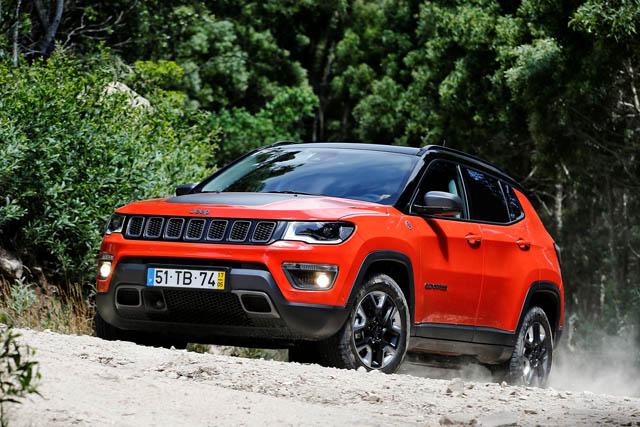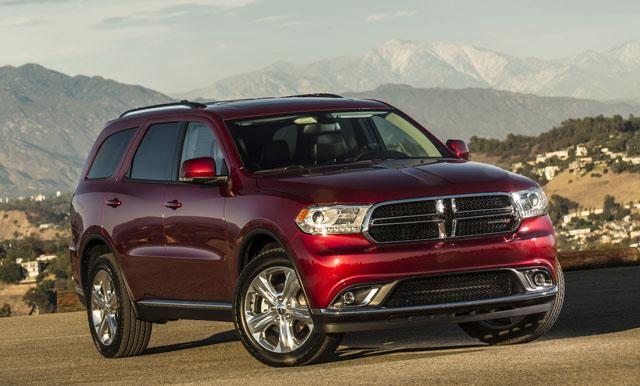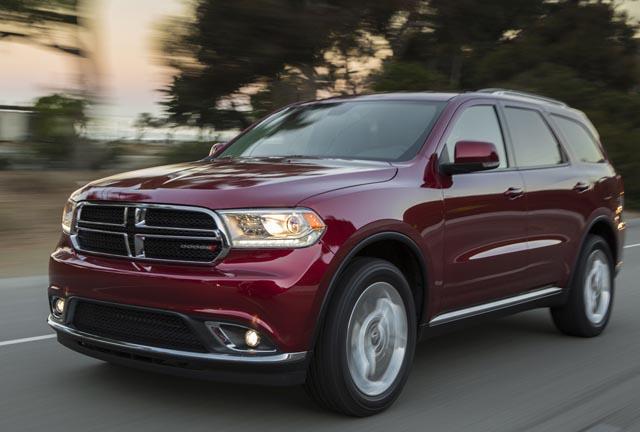You are here
Redefining the modern crossover as an off-roader
By Ghaith Madadha - Apr 21,2014 - Last updated at Apr 21,2014

Seeming like it drove off the set of a sci-fi flick, the new Jeep Cherokee looks like a design study of what a futuristic Jeep would look like. Beyond its striking shark-nosed grille, the new Cherokee’s refinement, efficiency, road manners, cabin ambiance and high-tech infotainment kit, and driving aids are a sea-change from its predecessor. Based on a car-like unibody structure, the Cherokee — and especially the brawny Trailhawk version tested — is Jeep’s take on an authentically off-road capable and modern mid-size crossover SUV and not just your average garden-variety soft-roader.
Stark and charismatic
Futuristic, aggressive and stark, the centrepiece of the new Cherokee’s design language is its high-set and sharply ridged and jutting grille, which features seven slats as per Jeep tradition, but which have honeycomb inlays and are carved out of the bodywork. Flanking the sharp grille are slim and high wraparound LED running lights, which sit above more discreet headlights and lower fog lights. Prominent bonnet, profile character line and rear tailgate ridges are juxtaposed with concave sheet metal the lends movement, while rear lights are a slightly angled and contemporary trapezoidal design.
Best looking in its most off-road capable Trailhawk guise, the Cherokee gains a matt black bonnet bulge paint for emphasis, distinctive red front and rear hooks and prominent “Trailhawk” and “trail-rated” badging underline its greater abilities. Trailhawk versions feature more lower black cladding to better complement the traditional squared-off wheel arches, and more prominence in the fascia, better emphasises the Cherokee’s assertive and jutting grille and rakish windscreen. Wearing slimmer and taller all-terrain tyres than the luxurious Limited version, and sitting higher off the ground, the Trailhawk is the most charismatic and defining version of the Cherokee.
Seamless and smooth
Powered by an all new 3.2 litre version of the Chrysler group’s much-lauded naturally aspirated 3.2 litre V6 Pentastar as the range-topping engine, the tested Cherokee Trailhawk develops 267BHP at 6,500rpm and 239lb/ft torque at 4,400rpm. Smooth, willing and high-revving, the 3.2 Pentastar also benefits from an early, broad and generous torque band for on-the-move flexibility as well as high-end power. Mated to a ZF-designed and Chrysler/Jeep built 9-speed automatic gearbox — a world’s first for an SUV — the Cherokee well-distributes its engine’s output for performance, on-the-move versatility and efficiency, which is also aided slippery CD0.332 aerodynamics.
With aggressively low first and second gearing and four-wheel drive off-the-line traction the Cherokee 3.2 litre sprints to 100km/h in about 6.6 seconds, while closely spaced and smooth shifting gears make progress seamlessly fluid and quick. The Cherokee’s gearbox is however designed for efficiency, with four overdrive ratios, including a very tall 0.48:1 ninth, while fifth is the direct ratio. Best left to its devices in most situations, one can however lock the top gear available and work gears through the gear lever’s sequential shift mode for more involvement, but there are no steering-mounted paddle shifters.
Refined ride
Built on a longer and wider platform based on the Alfa Romeo Giulietta hatchback and using front MacPherson strut and rear multi-link all-independent suspension, the Cherokee feels agile and refined on road for a mid-size SUV. Smooth riding, the Cherokee fluidly absorbs bumps, lumps and rough roads, while the Trailhawk’s taller tyre sidewalls help make it comfortable and supple. Stable and reassuring on highways, the Cherokee features good road noise, vibration and harshness isolation, while 2.67-turn steering finds a happy weighting medium, and between straight-line stability and a responsively quick ratio.
Considerably lighter than a full-size SUV at 1,862kg, the Cherokee turns in tidily, with one able to keep hands at the quarter-to-three position in most corners, while understeer was little evident at modest and somewhat brisk driving. Through corners the Cherokee Trailhawk leans slightly, but largely well controls weight transfers and remains poised, while four-wheel drive traction and grip make it reassuring through corners. With the top of the range of three four-wheel drive systems, the Trailhawk can divert power front-to-back as for grip, and can disengage the rear axle to reduce parasitic losses and improve efficiency.
Authentic ability
If the Cherokee is a world class crossover SUV, the Trailhawk version by contrast is a class leader and genuine off-road SUV worthy of the brand. Tested to a grueling level of ability the Trailhawk wears its “Trail rated” badges with pride. With 221mm ground clearance and a relatively short wheelbase and rear overhang the Cherokee Trailhawk boasts 23.3° break-over and 32.1° departure angles exceeding many full-size or off-road oriented SUVs, while raised suspension and a higher-set front bumper lend it comparably good 29.8° approach angle, and electronic hill descent and hill climb functions for offraoad novices.
The Trailhawk version transcends its front drive and car derived transverse engine layout and is an authentic off-roader with a unique version of the Cherokee’s drive-train featuring lockable four-wheel drive, low gear ratios for high power crawling and locking rear differential to ensure rear wheels make progress in low-traction conditions. With engine weight over front wheels and P245/65R17 all-terrain tyres, the Trailhawk effortlessly traversed rocks, gravel and desert dunes during test drive in Ras Al Khaimah, UAE, and rarely required deployment of off-road hardware. The Trailhawk also features Jeep’s Selec-train electronic offroad driver assist to optimise systems for various rugged environs.
Extensive kit and convenience
A marked improvement on its predecessor, the new Cherokee’s interior is noticeably better in fit and finish, with better quality plastics, design, cabin refinement and kit, with user-friendly controls, good visibility and soft touch textures aplenty. Fitted with manual eight-way driver’s seat and tilt-and reach steering adjustability, one could find an ideal driving position, while a chunky and sporty steering wheel and red stitching lent the Trailhawk’s interior a sporting feel. Front seat space was good, while rear seats benefited from slide and tilt adjustability for comfort and to expand luggage space, which expands from 696 to 1,554 litres.
Well-kitted, for safety and infotainment, the tested Trailhawk featured lane departure warning and automatic intervention, adaptive cruise control with stop and go ability, brake assist, forward collision warning, rear collision path detection, rearview camera and parallel and perpendicular parking assists, and three three-point rear safety belts and rear child seat LATCH anchors. Comfort and convenience kit included keyless entry and dual zone climate control. Tech kit included TFT vehicle information display between the dials and an 8.4 inch (21.3cm) smart phone integrated multi-media and function command centre touch screen Uconnect infotainment system with voice command.
SPECIFICATIONS
Engine: 3.2-litre, all-aluminium V6 cylinders
Bore x Stroke: 91 x 83mm
Compression ratio: 10.7:1
Valve train: 24-valve, DOHC
Gearbox: 9-speed automatic, four-wheel drive
Gear ratios: 1st 4.71 2nd 2.84 3rd 1.91 4th 1.38 5th 1.0 6th 0.81 7th 0.70 8th 0.58 9th 0.48
Reverse / low gear transfer / axle ratios: 3.83 / 2.92 / 3.251
Drive line: Low ratio transfer, locking rear differential
Power, BHP (PS) [kW]: 267 (271) [199] @ 6,500rpm
Torque lb/ft (Nm): 239 (316) @ 4,400rpm
Redline: 6500rpm
0-100km/h: 6.6-seconds (est.)
Fuel capacity: 60-litres
Minimum fuel: 91RON
Length: 4,624mm
Width: 1,903mm
Height, to rails: 1,723mm
Wheelbase: 2,718mm
Track, F/R: 1,613 / 1,614mm
Ground clearance: 221mm
Cargo floor height: 825mm
Kerb weight: 1,862kg
Weight distribution, F/R: 57% / 43%
Gross vehicle weight rating (GVWR): 2,494kg
Aerodynamic drag coefficiency: 0.332
Approach / break-over / departure angles: 29.8° / 23.3° / 32.1°
Headroom, F/R: 1,000 / 978mm
Legroom, F/R: 1,045 / 1,023mm
Shoulder room, F/R: 1,462 / 1,399mm
Hip room, F/R: 1,366 / 1,268mm
Rear knee clearance: 90mm
Cargo volume, min / max: 696 / 1,554 litres
Steering: Electric-assisted rack & pinion
Turning circle: 11.6 metres
Lock-to-lock: 2.67 turns
Suspension, F/R: MacPherson struts / Multi-link, coil springs, stabiliser bars
Brakes, F/R: Ventilated discs, 330 x 28mm / discs, 278 x 12mm
Tyres: P245/65R17 All-Terrain
Related Articles
That from afar and to the untrained eye, the new Jeep Compass seems uncannily similar to the iconic off-road brand’s largest Grand Cherokee
A happy compromise between full SUV and a car-like crossover, the Dodge Durango is a longer and more road- and family-oriented cousin to the more off-road focused Jeep Grand Cherokee.
Face-lifted for 2014 with a moodier and a more charismatic fascia, more sophisticated and efficient eight-speed automatic gearbox and a more advanced infotainment unit, the latest Dodge Durango is a welcome update to an already well-sorted medium- to large-family SUV.


















